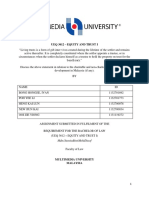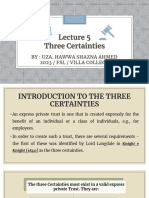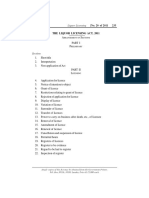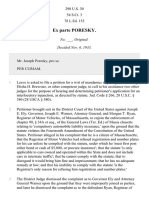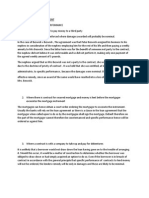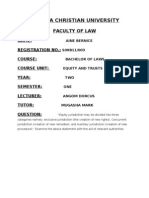The Islamic Law of Wills
The Islamic Law of Wills
Uploaded by
Akash SinghCopyright:
Available Formats
The Islamic Law of Wills
The Islamic Law of Wills
Uploaded by
Akash SinghOriginal Description:
Copyright
Available Formats
Share this document
Did you find this document useful?
Is this content inappropriate?
Copyright:
Available Formats
The Islamic Law of Wills
The Islamic Law of Wills
Uploaded by
Akash SinghCopyright:
Available Formats
The Islamic Law Of Wills
Dr. Abid Hussain
http://islaam.com//Article.aspx?id=527
This article is a very brief overview of the traditional Sunni Islamic law pertaining to the Islamic will. The aim of this article is to arouse awareness amongst Muslims particularly those living in the West regarding this important aspect of Islamic law. It should be stressed that when writing a will one should consult an Islamic scholar/legal expert to ensure that the will complies with Islamic law as well as the law of the country of residence. When a Muslim dies there are four duties which need to be performed. These are: 1. payment of funeral expenses 2. payment of his/her debts 3. execution his/her will 4. distribution of the remaining estate amongst the heirs according to Sharia The Islamic will is called al-wasiyya. A will is a transaction which comes into operation after the testator's death. The will is executed after payment of funeral expenses and any outstanding debts. The one who makes a will (wasiyya) is called a testator (al-musi). The one on whose behalf a will is made is generally referred to as a legatee (al-musa lahu). Technically speaking the term "testatee" is perhaps a more accurate translation of almusa lahu.
The importance of the Islamic will
The importance of the Islamic will (wasiyya) is clear from the following two hadith: "It is the duty of a Muslim who has anything to bequest not to let two nights pass without writing a will about it." (Sahih al-Bukhari) "A man may do good deeds for seventy years but if he acts unjustly when he leaves his last testament, the wickedness of his deed will be sealed upon him, and he will enter the Fire. If, (on the other hand), a man acts wickedly for seventy years but is just in his last will and testament, the goodness of his deed will be sealed upon him, and he will enter the Garden." (Ahmad and Ibn Majah) The will gives the testator an opportunity to help someone (e.g. a relative need such as an orphaned grandchild or a Christian widow) who is not entitled to inherit from him. The will can be used to clarify the nature of joint accounts, those living in commensality, appointment of guardian for one's children and so on. In countries where the intestate succession law is different from Islamic law it becomes absolutely necessary to write a will.
The Will (Al-wasiyya)
The Islamic will includes both bequests and legacies, instructions and admonishments, and assignments of rights. No specific wording is necessary for making a will. In Islamic law the will (wasiyya) can be oral or written, and the intention of the testator must be clear that the wasiyya is to be executed after his death. Any expression which signifies the intention of the testator is sufficient for the purpose of constituting a bequest. There should be two witnesses to the declaration of the wasiyya. A written wasiyya where there are no witnesses to an oral declaration is valid if it written in the known handwriting/signature of the testator according to Maliki and Hanbali fiqh. The wasiyya is executed after payment of debts and funeral expenses. The majority view is that debts to Allah (SWT) such as zakah, obligatory expiation etc. should be paid whether mentioned in the will or not. However, there is difference of opinion on this matter amongst the Muslim jurists.
The Testator (Al-musi)
Every adult Muslim with reasoning ability has the legal capacity to make a will. An adult for this purpose is someone who has reached puberty. Evidence of puberty is menstruation in girls and night pollution (wet dreams) in boys. In the absence of evidence, puberty is presumed at the completion of the age of fifteen years. The Maliki and Hanbali fiqh also consider the will of a discerning (tamyiz) child as valid. Under English Law you must be at least 18 years of age to make a valid will (similarly in most of the United States of America) unless you are a military personnel in which case you may make a valid will at the age of 17. The testator must have the legal capacity to dispose of whatever he bequests in his will. When making a will the testator must be of sane mind, he must not be under any compulsion and he must understand the nature and effect of his testamentary act. The testator must of course own whatever he bequests.
The testator has the right to revoke his will by a subsequent will, actually or by implication. In traditional Sunni Islamic law the power of the testator is limited in two ways: 1. Firstly, he cannot bequest more than 1/3 of his net estate unless the other heirs consent to the bequest or there are no legal heirs at all or the only legal heir is the spouse who gets his/her legal share and the residue can be bequeathed. Narrated Sa'd ibn Abi Waqqas (RA): "I was stricken by an ailment that led me to the verge of death. The Prophet came to pay me a visit. I said, "O Allah's Apostle! I have much property and no heir except my single daughter. Shall I give two-thirds of my property in charity?" He said, "No." I said, "Half of it?" He said, "No." I said, "Onethird of it?" He said, "You may do so, though one-third is also too much, for it is better for you to leave your offspring wealthy than to leave them poor, asking others for help..." (Sahih al-Bukhari, Sahah Muslim, Muwatta, Tirmidhi, Abu Dawud and Ibn Majah.) 2. Secondly, the testator cannot make a bequest in favour of a legal heir under traditional Sunni Muslim law. However, some Islamic countries do allow a bequest in favour of a legal heir providing the bequest does not exceed the bequeathable one-third. Legal heir in this context is one who is a legal heir at the time of death of the testator. Narrated Abu Hurayrah (RA): Allah's Prophet (SAWS) said, "Allah has appointed for everyone who has a right what is due to him, and no bequest must be made to an heir. (Abu Dawud). Similar hadith narrated by Abu Umamah (RA) and reported by Ibn Majah, Ahmad and others.
The Legatee (Al-musa lahu)
Generally speaking, for a bequest to be valid, a legatee must be in existence at the time of death of the testator except in the case of a general and continuing legatee such as the poor, orphans etc. The legatee must be capable of owning the bequest. Any bequest made in favour of any legal heir already entitled to a share is invalid under traditional Sunni Muslim law unless consented to by other legal heirs. An acknowledgement of debt in favour of a legal heir is valid. Acceptance or rejection of a bequest by the legatee is only relevant after the death of the testator and not before. Generally speaking once a legatee has accepted or rejected a bequest he cannot change his mind subsequently. If the legatee dies without accepting or rejecting the bequest, the bequest becomes part of the legatee's estate according to the Hanafi fiqh because non-rejection is regarded as acceptance. According to the other three main Sunni madhahib, the right to accept or reject the bequest passes onto the heirs of the legatee. There is difference of opinion as to the time at which ownership of a bequest is transferred from the testator (or his heirs) to the legatee. According to the Hanafi and Shafii fiqh the transfer of ownership is at the time of death of the testator, according to the Maliki and Hanbali fiqh the transfer of ownership is at the time of accepting the bequest. All the Sunni madhahib agree that if the legatee dies before the testator, the bequest is invalid since a bequest can only be accepted after the death of the testator. If there is uncertainty as to whether or not the legatee survived the testator, such as a missing legatee, the bequest is invalid because the legatee must be alive at the time of death of the testator for the will to be valid. If the testator and legatee die together, such as in an air crash, and it is not certain who died first, the bequest is invalid according to the Hanafi, Maliki and Shafii fiqh. But according to the Hanbali fiqh, the bequest devolves upon the legatee's heirs who may accept or reject it.
Executor of the will (Al-wasi Al-mukhtar)
The executor (al-wasi) of the will is the manager of the estate appointed by the testator. The executor has to carry out the wishes of the testator according to Islamic law, to watch the interests of the children and of the estate. The authority of the executor should be specified. Hanafi and Maliki fiqh state that the executor should be trustworthy and truthful; the Shafii fiqh state that the executor must be just. The Hanafi fiqh considers the appointment of a non-Muslim executor to be valid. The testator may appoint more than one executor, male or female. The testator should state if each executor can act independently of the other executor(s). If one starts acting as an executor, one will be regarded as having accepted the appointment, both in Islamic and in English law.
You might also like
- Awakening IslamDocument382 pagesAwakening IslamIbnu Adam Aviciena100% (1)
- Judicial Qualifications Complaint FormDocument5 pagesJudicial Qualifications Complaint FormAttachment Pathology DynamicsNo ratings yet
- Complete Equity 2.0Document22 pagesComplete Equity 2.0lynnster93No ratings yet
- Javad Hashmi - Lecture 2 - Sunni IslamDocument84 pagesJavad Hashmi - Lecture 2 - Sunni IslamZaky MuzaffarNo ratings yet
- Qalaid Al-Jawahir (English)Document62 pagesQalaid Al-Jawahir (English)Dar Haqq (Ahl'al-Sunnah Wa'l-Jama'ah)100% (2)
- Muslim WillDocument20 pagesMuslim WillArunaMLNo ratings yet
- Muslim Succession Under Sharia LawDocument58 pagesMuslim Succession Under Sharia Lawmd.jewel ranaNo ratings yet
- 4 Schools of Thought in IslamDocument15 pages4 Schools of Thought in IslamMadison Sheena86% (14)
- Living Trust Last Will and Testament VADocument12 pagesLiving Trust Last Will and Testament VACKNo ratings yet
- Worksheet 3 (13561)Document18 pagesWorksheet 3 (13561)Devon ButeNo ratings yet
- IntroductionDocument27 pagesIntroductionkendredpNo ratings yet
- All About WillDocument239 pagesAll About Willvishnu000No ratings yet
- Spousal Unity DoctrineDocument2 pagesSpousal Unity DoctrineRESEARCHNo ratings yet
- Fiduciary DeedDocument1 pageFiduciary Deedapi-224104463No ratings yet
- AsservationDocument1 pageAsservationcrazybuttfulNo ratings yet
- From (Abiha Zaidi (Abihazaidi - Nliu@gmail - Com) ) - ID (251) - Transfer of Property IIDocument18 pagesFrom (Abiha Zaidi (Abihazaidi - Nliu@gmail - Com) ) - ID (251) - Transfer of Property IIDivyanshu BaraiyaNo ratings yet
- Law On Trust ReviewerDocument8 pagesLaw On Trust ReviewerMarc Julius IINo ratings yet
- Law of Persons ReviewdDocument17 pagesLaw of Persons ReviewdHenry ObuyaNo ratings yet
- Criminal Breach of TrustDocument2 pagesCriminal Breach of TrustAFANo ratings yet
- Three CertaintiesDocument43 pagesThree CertaintiesALI SHAMMOONNo ratings yet
- Capacity, Appointment and Removal of Trustees: ELEMENT 1: State The Parties Element 2: CapacityDocument5 pagesCapacity, Appointment and Removal of Trustees: ELEMENT 1: State The Parties Element 2: CapacityJusween Sathar100% (1)
- Equity Trusts 118Document118 pagesEquity Trusts 118Najmul HasanNo ratings yet
- Equity-Mistake of Law-Recovery of MoneyDocument3 pagesEquity-Mistake of Law-Recovery of MoneyHenoAlambreNo ratings yet
- Administering An EstateDocument14 pagesAdministering An EstateAJ AJ100% (1)
- Liqour Licensing Act, 2011 PDFDocument29 pagesLiqour Licensing Act, 2011 PDFzed Trending HitsNo ratings yet
- Ex Parte Poresky, 290 U.S. 30 (1933)Document3 pagesEx Parte Poresky, 290 U.S. 30 (1933)Scribd Government DocsNo ratings yet
- Affidavit For DQ of JudgeDocument7 pagesAffidavit For DQ of JudgejoeNo ratings yet
- Synopsis: Jamia Millia IslamiaDocument26 pagesSynopsis: Jamia Millia IslamiaMohdSaqibNo ratings yet
- Transfer of Title Means Transfer of Ownership of The GoodsDocument7 pagesTransfer of Title Means Transfer of Ownership of The GoodsRITIKANo ratings yet
- Secrecy of Bank Deposits DigestDocument21 pagesSecrecy of Bank Deposits DigestKenneth DavidNo ratings yet
- Motion To Show CauseDocument2 pagesMotion To Show CausejeweljonesyNo ratings yet
- ! 1 InstructionsDocument1 page! 1 InstructionsMastersam888No ratings yet
- Equity and Trusts-LODELDocument7 pagesEquity and Trusts-LODELNuwaha OziusNo ratings yet
- Chapter 3 - Testamentary Capacity - Capacity To Sign As A WitnessDocument5 pagesChapter 3 - Testamentary Capacity - Capacity To Sign As A WitnessAnna Rombolakis100% (2)
- Do We Need The Bar Examination - A Critical Evaluation of The Justifications For The Bar Examination and Proposed Alternatives ?Document47 pagesDo We Need The Bar Examination - A Critical Evaluation of The Justifications For The Bar Examination and Proposed Alternatives ?Joshua of courseNo ratings yet
- Development Financial Institutions Act 2002 - Act 618Document92 pagesDevelopment Financial Institutions Act 2002 - Act 618peterparkerNo ratings yet
- Secret Trusts Express or Constructive ShahDocument3 pagesSecret Trusts Express or Constructive Shahshahmiran99No ratings yet
- The Mexican Trust Fideicomiso1Document6 pagesThe Mexican Trust Fideicomiso1artsan3No ratings yet
- Remonstrance 1769Document166 pagesRemonstrance 17692Plus100% (1)
- Trust Deed of Indian Institute of Public Policy (Iipp)Document8 pagesTrust Deed of Indian Institute of Public Policy (Iipp)Ramana KumarNo ratings yet
- What Is An Heir Definition Types Dying Intestate and ExamplesDocument3 pagesWhat Is An Heir Definition Types Dying Intestate and ExamplesemerituspensieroNo ratings yet
- Administration of Estates Act, 1961Document46 pagesAdministration of Estates Act, 1961Maame Ekua Yaakwae Asaam100% (1)
- 3 Inheritable PropertyDocument4 pages3 Inheritable PropertyZenZen100% (1)
- Duty To Keep AccountDocument10 pagesDuty To Keep AccountNur Amalina Muhamad100% (1)
- Foreign JudgementDocument91 pagesForeign JudgementPursha Monte Cara100% (1)
- 03 - PD Killer (If Necessary) PDFDocument1 page03 - PD Killer (If Necessary) PDFJerion Paragon EvansNo ratings yet
- $200M Floating Rate Subordinated Callable Notes Due 2040Document98 pages$200M Floating Rate Subordinated Callable Notes Due 2040Liam KimNo ratings yet
- Maxims of EqquityDocument17 pagesMaxims of EqquitymeherNo ratings yet
- Equity and Trust AssignmentDocument1 pageEquity and Trust Assignmentjohn7tago100% (2)
- Administration of Justice (Miscellaneous Provisions) Act 1933 C. 36Document9 pagesAdministration of Justice (Miscellaneous Provisions) Act 1933 C. 36LawrenceNo ratings yet
- Private Pik IndentureDocument211 pagesPrivate Pik IndentureDavid CartellaNo ratings yet
- Uganda Christian University: Faculty of LawDocument6 pagesUganda Christian University: Faculty of LawBernice AineNo ratings yet
- Defination of CourtDocument9 pagesDefination of CourtSanjay Darshan Behera100% (1)
- Indian Trusts Act-1882Document35 pagesIndian Trusts Act-1882vkailash12No ratings yet
- CS General Info 11-26-02Document10 pagesCS General Info 11-26-02wealth2520100% (2)
- Corporation and Securities NotesDocument7 pagesCorporation and Securities NotesJorge BandolaNo ratings yet
- Family Law II AnswersDocument36 pagesFamily Law II Answersshiv sharmaNo ratings yet
- Senate Hearing, 111TH Congress - Financial Services and General Government Appropriations For Fiscal Year 2011Document59 pagesSenate Hearing, 111TH Congress - Financial Services and General Government Appropriations For Fiscal Year 2011Scribd Government DocsNo ratings yet
- CONVERSIONDocument27 pagesCONVERSIONnazirmahamaNo ratings yet
- IBA Trust Guide PanamaDocument9 pagesIBA Trust Guide Panamaartsan3No ratings yet
- StudyAbroad TravelWaiverDocument1 pageStudyAbroad TravelWaiveridkthisusernameNo ratings yet
- John Doe V Jupiter Police ComplaintDocument10 pagesJohn Doe V Jupiter Police ComplaintLaw&CrimeNo ratings yet
- Equitable Property: Equity S2 2018 - Wk2 Cls 1 Julian LaurensDocument36 pagesEquitable Property: Equity S2 2018 - Wk2 Cls 1 Julian LaurenssdfklmjsdlklskfjdNo ratings yet
- Elsa Business Law AssignmentDocument5 pagesElsa Business Law AssignmentAbdiNo ratings yet
- The Laws Of War, Affecting Commerce And ShippingFrom EverandThe Laws Of War, Affecting Commerce And ShippingNo ratings yet
- The Tax Law of Charitable Giving: 2019 Cumulative SupplementFrom EverandThe Tax Law of Charitable Giving: 2019 Cumulative SupplementNo ratings yet
- Interfaith Dialogue Schools of Islam ThoughtsDocument2 pagesInterfaith Dialogue Schools of Islam ThoughtsClass DocumentNo ratings yet
- The Hanbalī School and MysticiDocument306 pagesThe Hanbalī School and MysticiRezart BekaNo ratings yet
- The Forbidden Passion Martyrdom of Love PDFDocument26 pagesThe Forbidden Passion Martyrdom of Love PDFElia KwanNo ratings yet
- Different Imam Shafie and Other Scholars-2Document15 pagesDifferent Imam Shafie and Other Scholars-2Muhamad DanialNo ratings yet
- Imam Ahmad Ibn Hanbal, Takfeer Tabdee Adn SiyaasahDocument34 pagesImam Ahmad Ibn Hanbal, Takfeer Tabdee Adn SiyaasahShabab ASHNo ratings yet
- Wahhabism 2nd Edition Revised Edited and AnnotatedDocument265 pagesWahhabism 2nd Edition Revised Edited and AnnotatedmausanpraNo ratings yet
- The Quran Is The Speech of Allah, Not A Creation, But Its Utterance Is Created - The Ash'arisDocument1 pageThe Quran Is The Speech of Allah, Not A Creation, But Its Utterance Is Created - The Ash'arisnisharNo ratings yet
- Taqleed of 4 ImamsDocument2 pagesTaqleed of 4 ImamsSiddi rizwanNo ratings yet
- Imam Abu Hasan Al-Ashari - G.F. HaddadDocument12 pagesImam Abu Hasan Al-Ashari - G.F. HaddadHelmiHassan100% (1)
- Bay' 'InahDocument16 pagesBay' 'InahHobi MonieNo ratings yet
- CreedsDocument56 pagesCreedsHailé SzelassziéNo ratings yet
- Muslim Law of Inheritance: KakinadDocument23 pagesMuslim Law of Inheritance: KakinadChhatreshNo ratings yet
- Understanding and Appreciating Muslim Diversity in Nottingham - Reports 64325Document50 pagesUnderstanding and Appreciating Muslim Diversity in Nottingham - Reports 64325Rashad SayafNo ratings yet
- The Development of MazhabDocument5 pagesThe Development of MazhabAbdul RahmanNo ratings yet
- Al-Hallaj in Kurdish TraditionDocument13 pagesAl-Hallaj in Kurdish TraditionShep Smith100% (1)
- The Hanbali School's Aqeedah On Allah's AttributesDocument80 pagesThe Hanbali School's Aqeedah On Allah's AttributesCommunity For Islamic ResearchNo ratings yet
- IBN AL JawziDocument11 pagesIBN AL Jawziميسرة محمدNo ratings yet
- Holtzman Livnat Islamic Theology PDFDocument13 pagesHoltzman Livnat Islamic Theology PDFAbu AbdelazeezNo ratings yet
- Studi Pemikiran Ibnu Qudamah Tentang Nikah Bersyarat: Vevi Alfi Maghfiroh, SyaefullahDocument18 pagesStudi Pemikiran Ibnu Qudamah Tentang Nikah Bersyarat: Vevi Alfi Maghfiroh, Syaefullahrica sugandiNo ratings yet
- Islamic Project UsamaDocument10 pagesIslamic Project Usamavishwajeet singhNo ratings yet
- Islamic Theology: January 2010Document14 pagesIslamic Theology: January 2010A Plus Abdul HafizNo ratings yet
- Syahadah 1Document1 pageSyahadah 1ydaNo ratings yet
- Wa'ad PDFDocument61 pagesWa'ad PDFZatil AqmarNo ratings yet
- Islamic Schools and BranchesDocument25 pagesIslamic Schools and BranchesfazamidNo ratings yet


